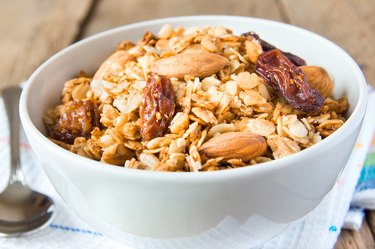A normally functioning digestive tract is essential for good general health and well-being. If you have problems with a spastic colon, also called irritable bowel syndrome, it's essential to pay attention to your diet. Although the exact cause of this disorder isn't well understood, symptoms can include abdominal pain and irritation, as well as frequent bouts of diarrhea or constipation. Spastic colon affects up to 15 percent of the U.S. population, according to the National Digestive Diseases Information Clearinghouse, which recommends dietary strategies to help control the symptoms.
Choose Low-Fat Foods
Video of the Day

Symptoms of a spastic colon can vary from person to person, but some people with this disorder benefit from eating a low-fat diet. Choose lean cuts of meat or poultry and remove visible fat before cooking. Cooking meat without added fat -- by grilling or broiling -- also helps. Pick low-fat or nonfat dairy products, such as milk, cheese and yogurt, and opt for low-fat ice milk or frozen yogurt over ice cream. When dining out, avoid fried foods and dishes with creamy sauces.
Video of the Day
Carbs and Fiber
The National Digestive Information Clearinghouse recommends people with spastic colons include pasta, rice and other carbohydrate-rich foods in your meals. It also advocates for increasing fiber intake, suggesting that adults consume 21 to 38 grams of fiber daily. Fiber softens stool, which helps it move more smoothly through the colon and lowers the likelihood of constipation. Fiber-rich foods include fruits and vegetables as well as whole-grain breads and cereals. Be cautious with beans, lentils, cabbage, broccoli and other gas-producing foods, which may cause bloating, gas or abdominal pain for some people. Boost fiber gradually, increasing your intake by 2 to 3 grams daily, to help avoid problems.
Foods to Avoid
Certain foods can cause problems for a spastic colon, especially during bouts of diarrhea. Examples include bacon; mayonnaise; nuts; corn; raw vegetables; highly spiced foods; alcoholic beverages, including beer or wine; and beverages containing caffeine or sweetened with artificial sweeteners called polyols. Because the trigger foods for people with spastic colon varies greatly from person to person, you may have to keep a diary of your food intake and symptoms to determine which foods cause problems for you.
Other Strategies
Besides choosing foods carefully, other strategies can help soothe symptoms of a spastic colon. Eat smaller, more frequent meals and choose smaller portions. Aim to consume at least eight glasses of fluid daily, preferably water. Take a multivitamin and mineral supplement that provides 100 percent of the recommended intake of vitamins and minerals, and minimize the amount of stress in your daily life. If you have or are concerned about a spastic colon, talk to your doctor or a registered dietitian about the best diet for you.
Is this an emergency? If you are experiencing serious medical symptoms, please see the National Library of Medicine’s list of signs you need emergency medical attention or call 911.